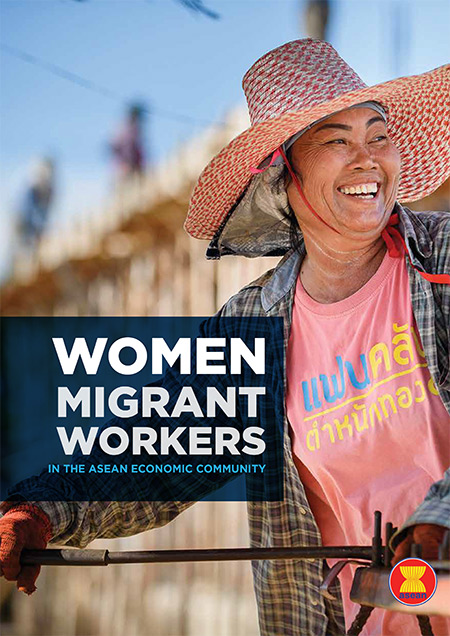Op-Ed: Empowering Women Workers for a better ASEAN
Date:
Author: Miwa Kato
The 10 members of the Association of Southeast Asian Nations (ASEAN) form an economic powerhouse. The ASEAN Economic Community is now the world’s seventh-largest economy and third-largest labour force, with enormous potential for further growth. But to maximize growth, the region needs to ensure that its labour force is diversified and ready to adapt, expand and move freely.
Currently, the ASEAN region is a hotspot for labour migration. It hosts a reported 9.9 million total international migrants; 6.9 million of them are from within ASEAN—easily a size of one country.
Women comprise nearly half of all intra-ASEAN migrant workers, and the percentage continues to grow, according to official data. However, this can be a significant underestimation due to the large presence of undocumented workers. But current labour governance frameworks are inadequate to ensure they enjoy adequate protection and equal rights.
Together with the ASEAN Secretariat, Friedrich-Ebert-Stiftung, and Indonesia’s Ministry of Manpower, UN Women today published an important study, “Women Migrant Workers in the ASEAN Economic Community”, which shows that the gains and opportunities of migration in the ASEAN labour market will benefit all if distributed more fairly.
The study, made possible through funding by the Australian Government Department of Foreign Affairs and Trade, found that women in ASEAN are concentrated in under-paid, low-skilled, under-valued occupations, where many work in insecure conditions with limited labour rights and social protection.
The study argues that women migrant workers need to be empowered to equally participate in and benefit from ASEAN’s economic integration, especially in the high-growth priority labour sectors for integration. To effectively contribute to growth areas, women need social protection, leaner recruitment processes with lower costs, and skills development and training, along with support, including legal aid, when in informal-sector employment. The study highlights the importance of instilling appropriate labour mobility mechanisms that also promote decent work for all.
The momentum is building up. ASEAN member states have committed to gender equality, and in recent years girls and women have made considerable gains in social areas, such as access to education and health, and equality before the law. However, more efforts are required to promote women’s effective labour force participation.
Our study shows that women migrant workers significantly contribute to the economies of both their countries of origin and destination. They remit a greater share of their income back to their families than male workers do, and invest more of it, in ways that benefit their children, communities and countries. Women also help drive up wages in the countries where they work, thus helping improve the lives of all workers.
Indeed, through promoting women’s equality and empowerment, ASEAN can drive overall growth. It’s not only the right thing to do – it is smart economics.
To empower women migrant workers and break down the barriers to realizing their full potential, it is essential to have ASEAN members taking their commitments further to achieve a people-oriented, people-centered ASEAN, where nobody gets left behind. They must onboard global initiatives that aim to empower women in the economy. Steps they can take include:
Giving financial, mentoring and other support to women-owned small and medium enterprises, which already are significant economic forces in some countries, can unleash growth furtherPromoting girls’ early career development, especially in science, technology, engineering, and mathematics (STEM), while putting behind outdated gender stereotypes and ensuring that girls will have equal chances to compete for the higher-value jobs of the Fourth Industrial RevolutionMaking incentives for the private sector to hire more women and give them decent work, starting by signing on to the (UN Women) Women’s Empowerment Principles (WEPs) and committing to corporate action to put gender concerns at the heart of responsible business practicesActively promoting cultural change at home and in the family, particularly in more equitable sharing of household work. More men are accepting equal responsibility in caring for children, the sick and the elderly. But women in the ASEAN region still do significantly more of the household and unpaid work than men, and this holds back women’s effective labour force participation.
These recommendations echo those of the recent U.N. High-Level Panel on Women’s Economic Empowerment led by the U.N. Secretary-General. The panel urged countries to change social norms so that men and women more equally share in caring for household members, ensure that women have equal access to resources including land, labor and capital, and support women’s employment by giving companies incentives to meet gender inclusion targets.
All of us—policymakers, companies and individuals—have a responsibility to make sure women are empowered with the right opportunities and further the right labour market conditions as workers that would drive ASEAN’s further economic growth.
This doesn’t just benefit women. As women are empowered, the overall economies and societies, and countries benefit, and this in turn will fuel intra-regional and global trade that will lift all 10 members of ASEAN, and further accelerate a people-centered growth which benefits all.

About the Author:
Miwa Kato is Regional Director of UN Women Asia and the Pacific.
This Op-ed is also published on Jakarta Post | Friday 07 July 2017 (Archived )
